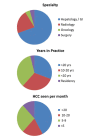Hepatocellular carcinoma: Consensus, controversies and future directions. A report from the Canadian Association for the Study of the Liver Hepatocellular Carcinoma Meeting
- PMID: 25965437
- PMCID: PMC4444026
- DOI: 10.1155/2015/824263
Hepatocellular carcinoma: Consensus, controversies and future directions. A report from the Canadian Association for the Study of the Liver Hepatocellular Carcinoma Meeting
Abstract
Hepatocellular carcinoma (HCC) is a leading cause of cancer-related mortality worldwide and its incidence has rapidly increased in North America in recent years. Although there are many published guidelines to assist the clinician, there remain gaps in knowledge and areas of controversy surrounding the diagnosis and management of HCC. In February 2014, the Canadian Association for the Study of the Liver organized a one-day single-topic consensus conference on HCC. Herein, the authors present a summary of the topics covered and the result of voting on consensus statements presented at this meeting.
Le carcinome hépatocellulaire (CHC) est une cause majeure de mortalité liée au cancer dans le monde. Ces dernières années, son incidence a augmenté rapidement en Amérique du Nord. Même si de nombreuses directives sont publiées pour venir en aide au clinicien, il reste des lacunes et des controverses à l’égard du diagnostic et de la prise en charge du CHC. En février 2014, l’Association canadienne pour l’étude du foie a organisé une conférence consensuelle d’une journée entièrement consacrée au CHC. Dans le présent article, les auteurs présentent un résumé des sujets traités et les résultats des votes sur les déclarations consensuelles qui y ont été présentées.
Figures



References
-
- European Association For The Study Of The Liver; European Organization For Research And Treatment Of Cancer EASL-EORTC clinical practice guidelines: Management of hepatocellular carcinoma. J Hepatol. 2012;56:908–43. - PubMed
-
- Public Health Agency of Canada Mortality Statistics. < www.phacaspc.gc.ca/sti-its-surv-epi/model/pdf/model07-eng.pdf> (Accessed February 1, 2014).
Publication types
MeSH terms
LinkOut - more resources
Full Text Sources
Medical

